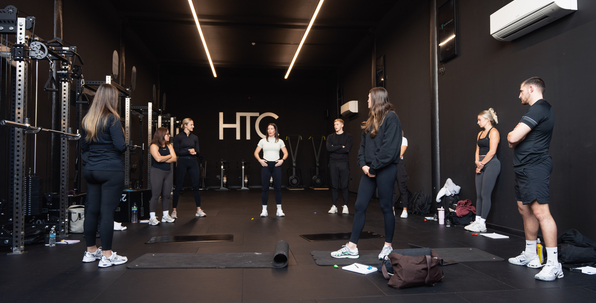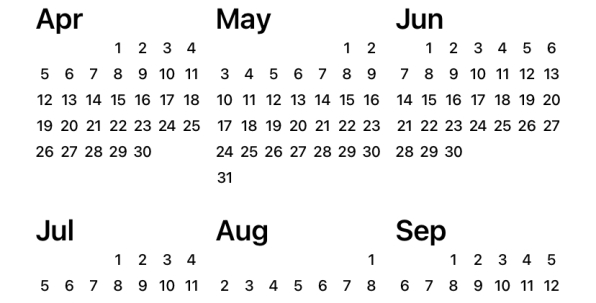Feature Blog
We've teamed up with The Fitness Truck® who've explained the importance of rest. Something we can all get on board with during this period!
How do you find the perfect balance between rest and exercise? How much exercise is too much? And how do you know when you’ve gone too far? We’ve covered everything you need to know about getting enough rest her in this blog, so you can make the most of your workouts.
It’s easy to think that the more you exercise, the better it is for you, but this is far from the truth. There’s a limit to how much exercise you can do before you reach your physical and mental limits, and then things start to go downhill. Moderation is key when it comes to wellness, and this doesn’t fall short for rest days.
In today’s constantly busy world, it can be difficult to slow down and switch off. We get carried away. We’re taught to always be doing something, and to go full throttle in everything that we do. Yet, this often leads to burnout, fatigue and hard-to-meet expectations – and this is especially true for exercise.
Getting lost in the world of social media is a slippery slope. With influencers constantly posting photos at the gym, and everyone posting the best versions of themselves, it sets the bar incredibly high. But remember: social media is a warped reality. Your fave Instagrammer isn’t really at the gym twice a day, seven days a week – despite what it may it look like online. Comparing yourself to their online persona is easy to do, but next time you’re scrolling through social media and start feeling bad that you skipped the gym this morning – let yourself off. Remember, everything you see online is curated to look the best it can.
Rest days are important. When we over-train, we start to put ourselves at a higher risk of everything from injury to burnout. Our bodies can only do so much, and with the stresses of work life and family relationships taking their daily toll, it can all soon add up.
In fact, if you don’t take rest days, then your body will soon force you to. Whether it’s from hurting yourself or losing your mental drive to exercise, you’ll be unable to stay in the groove of your regular sessions.
Rest days aren’t something to fear, but should be enjoyed. They’re beneficial in more ways than they aren’t, and provide your body and mind a chance to recover.
So, how do rest days help? Here are just some of the benefits of taking regular, planned rest days, so you can hit the gym harder and stronger than before.
Rest to minimise stress
We’ve got loads to say on how exercise can reduce stress (so much that we wrote a whole blog on it!). With everything from an increased emotional resilience to an improved mood, moving your body is extremely beneficial when it comes to balancing hormone levels. However, there’s also a limit to how much exercise can help. Over exercising can put excess stress on the body, and flip things into overdrive.
As well as the mental toll of never taking a break, physical stress can also play a role. When you take part in high-intensity exercise, you put stress on your body. In order to see results from this stress, you need to give your muscles time to adapt and recover, or you risk falling into a plateau. As Pete McCall, an ACE-certifies personal trainer, says to NBC: “Fitness improvements happen after the workout, not during it.”
Giving your body the rest it needs is vital to strength and endurance improvements. Staying on track through active recovery days is the best way to help yourself recover, and avoid excess mental and physical stress.
Restoring and repairing muscles
Exercise creates two types of stress on your muscles: metabolic and mechanical stress. Metabolic stress comes from depleting the energy stored in individual muscle cells, and mechanical stress is created by the physical damage done to the structures of muscle proteins when exercising. Both of these are important for muscle grown, so that we can eventually get fitter during our workouts.
Muscle growth occurs by repairing damage done to our muscles during exercise. Every time we put a strain on our body, our muscles experience small tears, which become stronger when our bodies repair themselves. This then, over time, leads to becoming fitter.
Rest days are vital to repairing the muscles after a workout. Without this restoration, we risk causing too much harm to our muscles, to the point where we risk prolonging growth. Avoiding rest days is counterproductive, and can actually cause us to stagnate with our progress.
Helps the immune system
Taking rest days are important for protecting the central nervous system and preventing fatigue. There’s even a condition called Overtraining Syndrome (OTS), which refers to the overload of stress on the body’s CNS from not taking rest days.
When your mind and body are fatigued, it means your training takes a hit. The tiredness seeps into other areas of your life, meaning your motivation for taking a walk on your lunch break, or going to that spin class, will be drained. In the long run, this means that, rather than increasing your strength and endurance abilities through working out, you’re more likely to take steps backwards. Exhaustion is the enemy to progress.
Prevents injuries
Rest is critical to avoiding injury as it provides a strong basis for muscle growth and endurance. Aston University recommend taking at least 1-2 days off a week to rest in order to avoid injuries. When you don’t take breaks, you’re at risk of developing repetitive strain injuries, which develop when muscles are overused.
Skipping rest days can also lead to poor form, as the fatigue in your body means you can’t perform at your optimum. These improper techniques can lead to severe injuries, as you use the wrong muscles when training.
A mental break
Rest days help you mentally, too. Too little rest can cause you to burnout, meaning the physical and mental fatigue of training catches up to you, and you come to a complete halt.
Burnout occurs when you’re exposed to excessive and prolonged stress. Exercise, in itself, is a major form of stress on the body, despite it being a good thing. When exercise is something you do frequently, it’s extremely important to pay attention to other areas of your life which may cause excess stress. For example, if you’re having a bad week at work, or your family life is rough, you should pay attention to your performance at the gym. If your workouts are also having a tough time, you’ll really benefit from a rest day.
Your mind is the be-all-or-end-all of your physical health, as it’s so closely linked to your immune system and central nervous system. Looking after it is extremely important for a healthy wellbeing.
So, how can you find a balance between rest and exercise? It can be extremely difficult to gauge when you need a break, compared to when you’re just feeling downright lazy (which everyone feels like occasionally… trust us!). Taking a rest day because you can’t be bothered compared to taking one because you need to are definitely two different things.
The more you exercise, they more you’ll be able to tune into your body’s natural needs. Spacing out high-intensity sessions with lower-intensity workouts is vital to recovery. We need to avoid reaching our physical and mental limits; it’s never a fun place to be).
Ideally, 1-2 rest days per week will keep your mind and body well-rested, without over doing it. This, of course, all depends on you personally. If your body is screaming for a day off, listen to it. As we mentioned earlier on, if you don’t listen to your body you’ll risk injury and mental fatigue – and your body will force you to have a day off instead.
Rest days don’t have to be completely sedentary, and we encourage you to take ‘active rest days’. Take the dog on a long walk, try a yoga session, or park a bit further away from your office so you’re forced to get your steps in. When you take a rest day, try to still get in some form of light activity. This way, you’re still keeping yourself on track, and upping your daily NEAT (the daily energy expended outside of exercise).
About the Author
Pete Swatkins is the founder and principal trainer at The Fitness Truck®, the gym that comes to you! Pete founded The Fitness Truck® in 2016 after a challenging year prompted him to bite the bullet and start his own business. Combining a degree in Sports Science, over 12-years of professional and semi-professional rugby experience, plus a knack for getting the best out of people, The Fitness Truck® was born. Fast forward to 2020 and we’ve got a healthy mix of Private, Exclusive and Corporate clients (Our PEC’s). We bring our mobile training sessions to each of them at a time and place that suits them best, meaning no last minute rushing to a gym class, and no settling on the sofa and losing all motivation to get active. Our trusty truck is packed full of equipment from slam balls to dumbbells, battle ropes to boxing gloves so our sessions are always fresh & fun. Check us out for yourself - we’re on all the usual social channels – and drop us a line if you’d like to get involved.








